People
James Madison
1751-1836
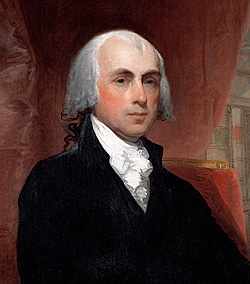
James Madison
By Gilbert Stuart, 1804. Courtesy Colonial Williamsburg Foundation, Williamsburge, VA. Gift of Mrs. George S. Robbins.
Prologue
James Madison, jr., was the son of a prominent Virginia planter from Orange County, Virginia. Studious by nature and well-educated, Madison came of age during the revolutionary era. He developed a passion for both politics and political theory. After attending the convention that produced Virginia's new republican constitution and bill of rights in 1776, Madison was elected to the eight-member Governor's advisory Council. Two years later, in 1780, he was chosen to represent Virginia at the Second Continental Congress. His small stature (he stood less than 5' 5" and weighed only about 100 lbs.) did not prevent Madison from dominating the political landscape during the creation and ratification of the United States Constitution.(1)
Our Case Is Desperate
As a member of the Confederation Congress, Madison had experienced the frustrations and anxieties of trying to win a war without money or the means of raising it. After leaving Congress in 1784 (term limits in the Articles of Confederation prevented him from serving longer) Madison continued working to increase the authority of the national government, including the power to raise revenue from the individual states.(2)
In 1786, Madison saw an opportunity to strengthen the revenue-raising powers of the national government. The Virginia Assembly appointed him to attend an inter-state convention at Annapolis, Maryland, in September called to address issues of trade and commerce. The turnout was disappointing, to say the least. Only 12 delegates from five states came. Madison and his fellow attendees refused to give up, however. Before adjourning, they called on the states to issue a call for delegates to attend another convention the following May. This second convention, to be held in Philadelphia, would "take into consideration the situation of the United States" and "devise such further provisions as shall appear to them necessary to render the constitution of the Federal Government adequate to the exigencies of the Union."(3)
It was a bold move, but men like Madison and Alexander Hamilton of New York believed the states were approaching a crisis point. To them, the court closings and armed confrontations in Massachusetts that fall and winter were dramatic symptoms of a terminal illness afflicting the states and the national government. Madison wrote to George Washington, in November 1786, "[i]f the lessons which it inculcates should not work the proper impressions on the American public, it will be a proof that our case is desperate."(4)
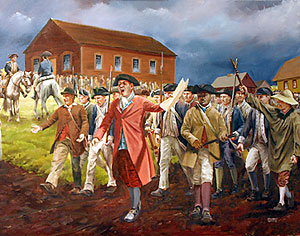
James Madison warned George Washington that the court closings in Massachusetts were a
lesson Americans could not afford to ignore.
In the same letter, Madison informed Washington that the "recommendation from Annapolis in favor of a general revision of the federal system was unanimously agreed to." The current crisis demanded the highest levels of participation and engagement from all the states. "It has been thought advisable to give this subject a very solemn dress, and all the weight that could be derived from a single State…This idea will be pursued in the selection of characters to represent Virg.a in the federal Convention." Madison explained that Washington's attendance at the convention was an essential part of this strategy:
You will infer our earnestness on this point from the liberty which will be used of placing your name at the head of them. How far this liberty may may correspond with the ideas by which you ought to be governed, will be best decided, where it must ultimately be decided. In every event it will assist powerfully in marking the zeal of our Legislature, and its opinion of the magnitude of the occasion.(5)
Like Hamilton and others, Madison was convinced that George Washington's presence was essential if the Philadelphia Convention was to succeed in its efforts to save America's republican experiment. It was, he told the general on December 7, 1786, "the opinion of every judicious person I consulted, that your name could not be spared from the Deputation to the Meeting in May at Philadelphia."(6)
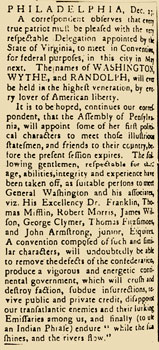
This article in the Massachusetts Hampshire Gazette
confirmed Madison's belief that
respect for the Constitutional Convention would increase if George Washington attended.
More info
During these same months, Washington was receiving alarming reports of the rebellion in Massachusetts from trusted correspondents like Henry Knox and Benjamin Lincoln. Madison was careful to prevent news of General Lincoln's successes in quelling organized resistance from lulling Washington into a false sense of optimism. He wrote to Washington on February 21, 1787 acknowledging that "[o]ur latest information from Massachusetts gives hope that the mutiny, or, as the Legislature there now style it, the Rebellion is nearly extinct." But, he added, "[i]f the measure however now on foot for disarming and disenfranchising those concerned in it should be carried into effect, a new crisis may be brought on."
Madison was referring to the Massachusetts General Court's decision to punish citizens who had taken up arms against the government by denying them the vote. He strongly disapproved of these measures and thought they would do more harm than good. He expressed his concerns in a letter to Edmund Randolph of Virginia:
there is reason to apprehend that every thing is not yet right in Massts. and that the discontents are rather silenced than subdued. The measures taken by the Legislature of that state prove that such is their view of the matter. They have disfranchized a considerable proportion of the disaffected voters, have voted a military force for the purpose of maintaining the tranquility of the Commonwealth, and their Delegates in pursuance of instructions have within a few days put on the Journals of Congs. a representation including an assertion of right to federal support in case of necessity."(7)
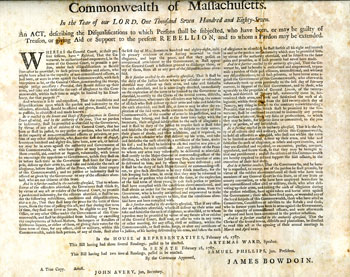
James Madison criticized the Massachusetts Disqualification Act for taking from former
insurgents their right to vote in exchange for a government pardon.
More info
In Madison's opinion, the real question was, "Whether the calm which he [General Lincoln] has restored will be durable or not…From the precautions taken by the Government of Massachusetts, it would seem as if their apprehensions were not extinguished." Madison also wrote disapprovingly of the harsh measures taken by the Massachusetts government. In a letter to Thomas Jefferson, who was abroad in Paris, Madison criticized the strong military presence Governor James Bowdoin insisted on maintaining: "Besides disarming and disenfranchising, for a limited time, those who have been in arms, as a condition of their pardon, a military corps is to be raised to the amount of one thousand or fifteen hundred men, and to be stationed in the most suspected districts."(8)
Madison found the reaction of former insurgents to the loss of their civil rights entirely predictable: "It is said that…a great proportion of the offenders choose rather to risk the consequences of their treason, than to submit to the conditions annexed to the amnesty; that they not only appear openly on public occasions, but distinguish themselves by badges of their character; and that their insolence is in many instances countenanced by no less decisive marks of popular favor than election to local offices of trust and authority."(9)
Clearly, it was not the armed uprising in Massachusetts that most concerned Madison. He had little doubt that General Lincoln's army would suppress the armed insurgency. Madison feared much more that the beliefs and sentiments of the insurgents might make their way into the state legislature. He needed to look no farther than Rhode Island for an example of a state where debtor interests had taken over the government. The so-called Country Party had passed exactly the sort of debtor relief laws and paper currency the Massachusetts Regulators had demanded. Worse, the Rhode Island law required all creditors to accept rapidly-depreciating paper as legal tender, on a par with gold and silver. Such laws were far more dangerous in Madison's mind than the extralegal activities of the Massachusetts Regulators. The reports that former insurgents were being elected to office in the wake of the rebellion, combined with Governor John Hancock's lenient debtor relief policies, confirmed Madison's worst fears for Massachusetts.
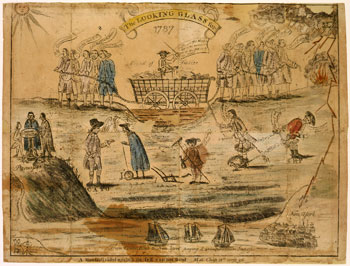
This depiction of unrest in Massachusetts invading the Connecticut Legislature
confirmed James Madison's worst fears that the state governments were inherently unstable.
More info
For Madison, Shays' Rebellion and its aftermath was an alarming symptom of a graver, potentially fatal disease afflicting all the states. In April 1787, one month before the Philadelphia Convention was due to convene, Madison wrote a critique of the national government and states, titled, "Vices of the Political System of the United States." Democratic excesses and injustices by the state legislatures, including controversial debtor relief in the form of "Paper money, instalments of debts, occlusion of Courts, [and] making property a legal tender" dominated Madison's list of "Vices".(10)
In Madison's view, only a strong, federal government would effectively curb the worst excesses of the states and maintain the individual liberties of the people. In a letter to Edmund Pendleton in February, 1787, Madison bluntly described the crisis he believed threatened the survival of the United States.
Our situation is becoming every day more and more critical. No money comes into the Federal Treasury; no respect is paid to the Federal authority; and people of reflection unanimously agree that the existing confederacy is tottering to its foundation…Many individuals of weight, particularly in the Eastern districts, are suspected of leaning towards monarchy. Other individuals predict a partition of the states into two or more confederacies. It is pretty certain that, if some radical amendment of the single one cannot be devised and introduced, one or other of these revolutions, the latter no doubt, will take place.(11)
Leaders in other states agreed. In contrast to the poorly attended Annapolis Convention of the previous fall, 12 states sent a total of 55 delegates to Philadelphia in the wake of Shays' Rebellion.(12) Convinced that the fate of the nation hung in the balance, Washington attended and presided as president. Members voted to keep the proceedings a secret, to encourage absolute candor and free debate. Madison's meticulous notes, published after his death, offer an up-close view of the day-to-day debates, crises and compromises at the convention.(13)
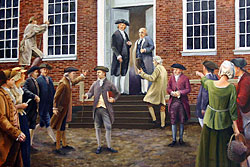
James Madison was instrumental in broadening the mission of the Philadelphia
Convention; instead of merely revising the existing Articles of Confederation,
the delegates created a completely new plan of government.
The resulting document reflected the vision of Madison and Hamilton of a federal government far more powerful than anything the revolutionaries had considered in 1776. The new plan alarmed men like Elbridge Gerry and Samuel Adams, who believed a strong central government posed a threat to individual liberties and the sovereignty of the states. But for Madison, the new constitution did not go far enough. He worried that the compromises reached at the convention would hinder the federal government in curbing the excesses of the state legislatures. While he publically supported the proposed Constitution, Madison privately thought that the loss of an absolute veto power on any and all state legislation may have fatally weakened the new federal system. Before the convention, Madison had written to Thomas Jefferson that the central government must be empowered "[o]ver & above the positive power of regulating trade and sundry other matters in which uniformity is proper, to arm the federal head with a negative in all cases whatsoever on the local legislatures." This was an essential "defensive power." Without it, Madison's own "experience and reflection have satisfied me that however ample the federal powers may be made, or however clearly their boundaries may be delineated, on paper, they will be easily and continually baffled by the Legislative Sovereignties of the States."(14)
In the months following the creation of the Constitution, Madison anxiously followed the debates in the states over whether or not to ratify the work of the Convention. As one of the largest and most influential states, Massachusetts was a crucial battleground for ratification. Those favoring the proposed Constitution worried. The state had barely averted a bloody civil war the previous winter. The ratifying convention included men who had taken up arms during the Regulation and those who sympathized with their cause. Delegates were divided as to whether or not the proposed Constitution assaulted or protected essential liberties. Only the last minute support of Governor John Hancock and Samuel Adams helped the Federalists achieve ratification by a narrow, 19-vote margin. All eyes then turned to New York. James Madison, Alexander Hamilton and John Jay published in 85 pro-ratification essays explaining the Constitution to help build momentum for ratification there.(15) Originally appearing in New York newspapers and later published as a single volume, the Federalist Papers remain the finest discussion of the United States Constitution and representative government ever written.(16)
The Constitution went into effect in 1789 when New Hampshire became the ninth state to ratify.(17) Madison's work on the Constitution had not ended, however. In addition to being elected as a member of the First Congress from Virginia, Madison was charged with writing a bill of rights. Massachusetts and several other states had recommended that the Constitution include such amendments in order for the new government to gain the full trust and support of the people and the states.(18)
Madison was ambivalent at best about his task. He had worked with George Mason on the Virginia Bill of Rights. He had worked tirelessly to gain not just toleration, but full religious freedom in Virginia.(19) At the same time, he agreed with James Wilson of Pennsylvania and other Federalists that a bill of rights was neither essential nor a truly effective protection of a people's liberties. Madison explained his position in a letter to Thomas Jefferson in October, 1788, writing, "My own opinion has always been in favor of a bill of rights…At the same time I have never thought the omission a material defect." Madison reasoned that anything powers that they had not expressly delegated in the Constitution to the government remained with the people. Why, he reasoned, must a bill of rights spell out freedoms already reserved to the people? Nor did Madison believe that a piece of paper would automatically protect the people's inalienable rights from a government determined to take them away. He pointed out that recent "experience proves the inefficacy of a bill of rights on those occasions when its controul is most needed." In Virginia, Madison already had "seen the bill of rights violated in every instance where it has been opposed to a popular current" in matters of religion, economy and politics.(20)
Madison appealed to the best political science of the day to support his point: "Wherever the real power in a Government lies, there is the danger of oppression." Since "[i]n our Governments the real power lies in the majority of the Community…the invasion of private rights is cheifly to be apprehended, not from acts of Government contrary to the sense of its constituents, but from acts in which the Government is the mere instrument of the major number of the constituents." Having a written bill or declaration of rights would not guarantee the rights of the people. "Repeated violations of these parchment barriers have been committed by overbearing majorities in every State…Should a Rebellion or insurrection alarm the people as well as the Government, and a suspension of the Hab. Corp. be dictated by the alarm, no written prohibitions on earth would prevent the measure."(21)
In 1789, however, Madison willingly took on the task of drafting amendments. By then, he was a member of the United States House of Representative under the new Constitution. It had been a tight race; Madison had barely edged out his friend James Monroe. Key to Madison's narrow victory was his public support for a bill of rights. Thomas Jefferson wrote approvingly, "I am happy to find that on the whole you are a friend to this amendment. The Declaration of rights is like all other human blessings alloyed with some inconveniences, and not accomplishing fully it's object. But the good in this instance vastly overweighs the evil." He agreed with Madison that experience had proven "the inefficacy of a bill of rights. True. But tho it is not absolutely efficacious under all circumstances, it is of great potency always, and rarely inefficacious. A brace the more will often keep up the building which would have fallen with that brace the less." Jefferson therefore was " much pleased with the prospect that a declaration of rights will be added: and hope it will be done in that way which will not endanger the whole frame of the government, or any essential part of it."(22)
Keeping in mind that many states had recommended amendments as a condition of their ratification, and that two states (North Carolina and Rhode Island) still had not ratified, Madison knew that a bill of rights was necessary. He wanted to lead this effort in order to keep the language and goals of any proposed amendments consistent with his vision of what the amendments to the Constitution could and should include. On June 8, James Madison introduced what would become the Bill of Rights of the United States to the House of Representatives:
It cannot be a secret to the gentlemen in this house, that, notwithstanding the ratification of this system of government by eleven of the thirteen United States, in some cases unanimously, in others by large majorities; yet still there is a great number of our constituents who are dissatisfied with it; among whom are many respectable for their talents, their patriotism, and respectable for the jealousy they have for their liberty, which, though mistaken in its object, is laudable in its motive. There is a great body of the people falling under this description, who as present feel much inclined to join their support to the cause of federalism, if they were satisfied in this one point.(23)
Whatever he thought privately about the political theory behind a bill of rights, Madison had become convinced that amendments were necessary to cement the new union he had worked so hard to bring into existence. He urged his fellow Congressmen
not to disregard their inclination, but, on principles of amity and moderation, conform to their wishes, and expressly declare the great rights of mankind secured under this constitution. The acquiescence which our fellow citizens show under the government, calls upon us for a like return of moderation. But perhaps there is a stronger motive than this for our going into a consideration of the subject; it is to provide those securities for liberty which are required by a part of the community.(24)
Congress sent twelve of Madison's proposed amendments to the states for ratification. Ten were ratified, and the Bill of Rights became part of the United States Constitution in December, 1791.
Epilogue
James Madison followed his remarkable collaboration in the creation of the Constitution with a political career that extended another quarter century and included two terms as president of the United States. The politics of the new nation were no less turbulent than those of the 1780s. Fundamental disagreements over the economic character and future of the new republic fueled political squabbles, party faction, and bitter, personal animosities. Madison and Alexander Hamilton had worked closely in crafting and then ratifying the Constitution. In the 1790s, however, they found themselves on opposite ends of the political spectrum. Federalists, including Alexander Hamilton and John Adams squared off against Democratic Republicans Thomas Jefferson and James Madison. Fearing what he saw as the aristocratic and anti-republican tendencies of the Federalists, Madison rejoiced at Jefferson's victory over John Adams in the presidential election of 1800. After serving as Secretary of State during Jefferson's two terms, Madison easily defeated the Federalist candidate, Rufus King of Massachusetts, in the election of 1808. The disruption of trade and hard times during the War of 1812 made "Mr. Madison's War" extremely unpopular in Massachusetts and other New England states. When Madison at last retired from public life in 1817, friends and opponents were able to agree that, while they had not always approved of his policies, Madison was devoted to upholding the Constitution he had been instrumental in creating. Abigail Adams referred to Madison as what the poet Alexander Pope had once called "the noblest work of God: an honest man." The last of the founding fathers, James Madison died in 1836 at the age of 85. (25)
About This Narrative
Note: All narratives about people are, to the extent possible, based on primary and secondary historical sources.
See Further Reading for a list of sources used in creating this narrative. For a discussion of issues related to telling people's stories on the site, see: Bringing History to Life: The People of Shays' Rebellion
| Print | Top of Page